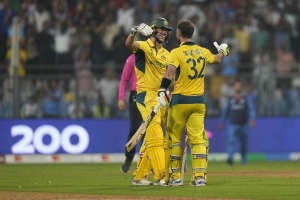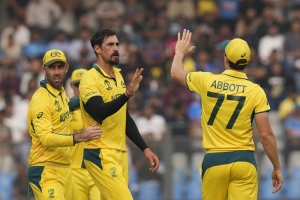Glenn Maxwell rewrote the World Cup record books as he single-handedly batted Australia to a remarkable win over Afghanistan.
Maxwell defied “horrific” back spasms to hit an unbeaten 201 and power his side from 91 for seven to 293 and a three-wicket win.
It was Australia’s first one-day international double century and here the PA news agency looks at the records set by Maxwell and his eighth-wicket partner Pat Cummins.
Double delight
The highest ODI score by an Australia batter stood at 185 not out, by Shane Watson against Bangladesh in 2011, until Maxwell’s astonishing effort in Mumbai.
It is only the third double century at a World Cup, with West Indies star Chris Gayle setting a record of 215 against Zimbabwe in 2015 but then watching New Zealand’s Martin Guptill top it with 237 not out against his side later in the same tournament.
He is only the ninth man to make an ODI double hundred, with 11 such scores in total, including three for India’s Rohit Sharma. Maxwell made Australia only the fifth nation represented on that list – India with seven from Sharma, Sachin Tendulkar, Virender Sehwag, Ishan Kishan and Shubman Gill, while Fakhar Zaman hit 210 not out for Pakistan against Zimbabwe in 2018.
In 128 balls, Maxwell’s is also the fastest World Cup double – Gayle took 138 balls to reach the landmark and Guptill 152. Kishan narrowly held on to the fastest ODI double, in 126 balls against Bangladesh last year.
The inning was completed fittingly with the winning six, Maxwell’s 10th to go with 21 fours – only Guptill, with 24 fours and 11 sixes in his 237, has scored more runs in boundaries in a World Cup innings.
Perfect partner
“Just ridiculous!” Cummins told Sky Sports with a smile, adding: “It’s got to be the greatest ODI innings that’s ever happened, it’s one of those days where you just go, ‘When that happened, I was here in the stadium’.”
The Australia captain was far more than a mere spectator, though, defying Afghanistan for 68 balls in a two-hour stay at the crease.
He contributed 12 runs to a lop-sided partnership of 202, which destroyed the ODI record for the eighth wicket – an unbroken 138 between South Africa’s Justin Kemp and Andrew Hall against India in 2006 – and the Australian best of 119 between Paul Reiffel and Shane Warne against the Proteas in 1994.
It was also the first 200 stand for any wicket from the seventh downwards – the previous record being Jos Buttler and Adil Rashid’s 177 for England’s seventh wicket against New Zealand in 2015.
Mitchell Marsh’s 24 was the second-highest score as Maxwell racked up 68.6 per cent of Australia’s runs in the innings – only West Indies great Sir Viv Richards has ever scored a greater share of his team’s runs in a completed ODI innings, 189no in a total of 272 for nine against England in 1984 (69.5 per cent).
Afghanistan contributed valiantly to a thrilling match and, while it will be relegated to a footnote after Maxwell’s heroics, opener Ibrahim Zadran carried his bat for 129no to record their first World Cup century.






























